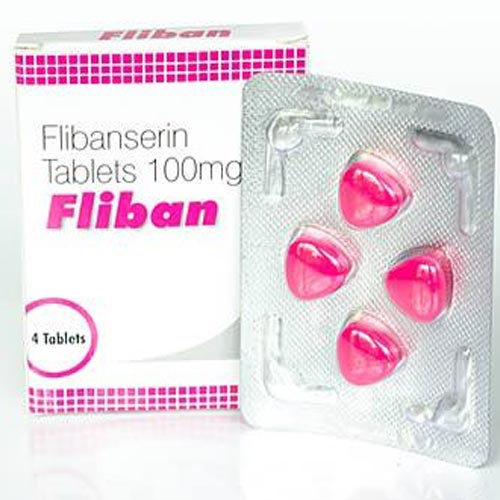Description
Flibanserin is the first drug to be approved for hypoactive sexual desire disorder (HSDD) in premenopausal women by the FDA in August 2015. It was originally developed as an antidepressant medication by Boehringer Ingelheim, but showed lack of efficacy in trials and was further developed as a hypoactive sexual disorder drug by Sprout Pharmaceuticals.
Flibanserin is used to treat decreased sexual desire in women who have not gone through menopause and who have never had low sexual desire in the past. Flibanserin is for use only when low sexual desire is NOT caused by a medical condition, a mental disorder, relationship problems, or by using drugs or other medicines.
Flibanserin is not for women who have already gone through menopause. flibanserin is also not for use by men.
Flibanserin may also be used for purposes not listed in this medication guide.
Pharmacodynamics
Mixed 5-HT1A Agonist/5-HT2A Antagonist
Associated Conditions: Hypoactive Sexual Desire Disorder (HSDD).
Hypoactive sexual desire disorder: Treatment of premenopausal women with acquired, generalized hypoactive sexual desire disorder (HSDD), as characterized by low sexual desire that causes marked distress or interpersonal difficulty and not due to a coexisting medical or psychiatric condition, problems within the relationship, or the effects of a medication or other drug substance.
Mechanism of action
Flibansetrin has high affinity for serotonin receptors in the brain: it acts as an agonist on 5-HT1A and an antagonist on 5-HT2A. In vivo, flibanserin binds equally to 5-HT1A and 5-HT2A receptors. However, under higher levels of brain 5-HT (i.e., under stress), flibanserin may occupy 5-HT2A receptors in higher proportion than 5-HT(1A) receptors.
It may also moderately antagonize D4 (dopamine) receptors and 5-HT2B and 5-HTB2C. Its action on neurotransmitter receptors may contribute to reduction in serotonin levels and increase in dopamine and norepinephrine levels, all of which may play part in reward processing.
Side effects
All medicines may cause side effects, but many people have no, or minor, side effects.Some medical conditions may interact with Flibanserin.
Tell your doctor or pharmacist if you have any medical conditions.
Common side effects may include: dizziness, drowsiness, tiredness, nausea, dry mouth or sleep problems (insomnia).
This is not a complete list of all side effects that may occur. If you have questions about side effects, contact your health care provider.


Reviews
There are no reviews yet.